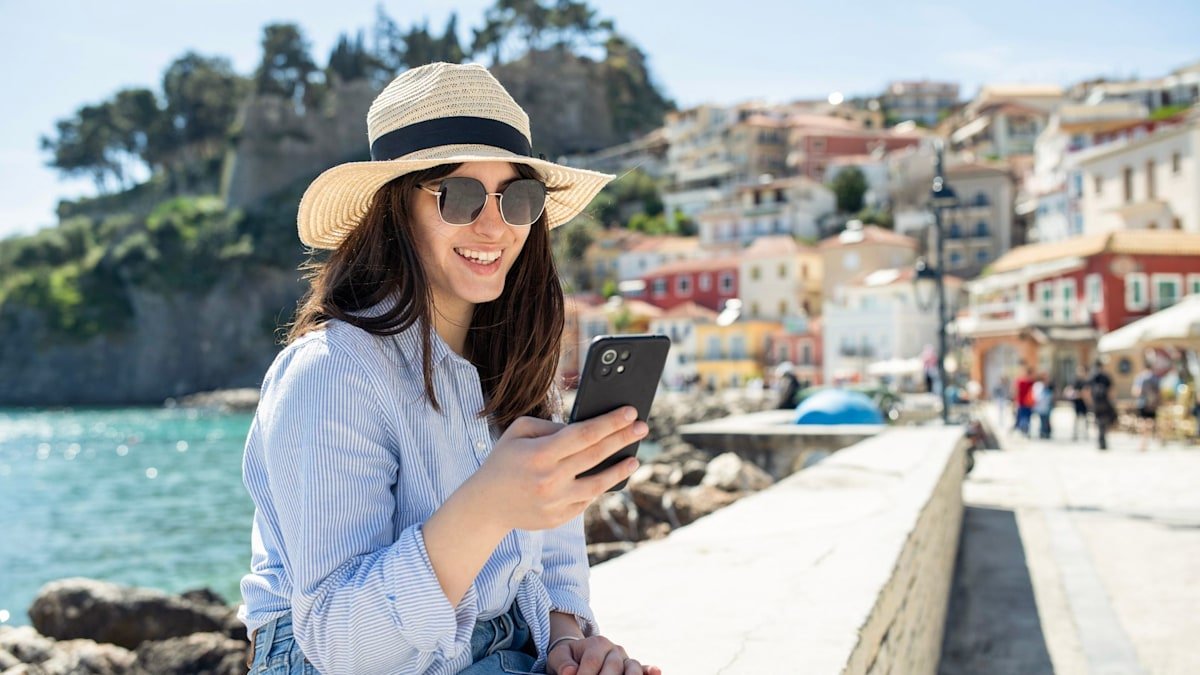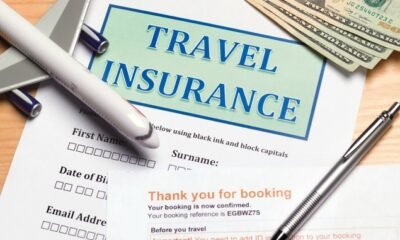Solo Travellers
This little-known iPhone hack is a ‘game-changer’ for my solo trips

I’ll be the first to admit that I’m not a very ‘techy’ person.
So when I bought my new iPhone 16 a couple of months ago, I continued to use my device the way I have been doing so for years, despite it being quite the upgrade from my previous model.
A lot of the shiny new specifications and advanced features go over my head.
However, one thing I always ensure is a very obvious upgrade to my untrained eye is the camera.
Not only that, but I recently learned a new hack to do with the camera that will seriously upgrade my game the next time I take a trip abroad.
Particularly as I’m beginning to value solo travel more and more.
If, like me, you’re a newbie to stuff like this, here’s the hack you didn’t know you needed.
The camera hack I recently learned that will come in handy abroad
If you’ve ever wandered through the streets of a local town, gazing up at beautiful monuments and found yourself eager to know more, then the Apple Visual Intelligence is one for you to try. It essentially does the research for you.
By heading to ‘Settings’ and switching the intelligence on, your camera can then become something of a search engine in itself. Clever, right?
Once activated, you can use the Camera Control button (that curious new button on the lower right side of the device) to bring up the visual intelligence.
I gave it a go for myself and found it very easy to set up.
I then decided to put it to the test by pointing my camera towards a framed piece of art in my living room. A quick tap of the ‘search’ button that comes up instantly, and I was inundated with information on the Van Gogh painting on my wall.
While I, of course, already knew about said painting since it’s in my house, it was a quick and surefire way to test the feature out and prove that it really does work.
And given my next solo trip to Europe is as soon as next month, I’m already imagining being somewhere beautiful, such as an art museum or strolling down some cobbled streets, and finding this feature extremely handy.
Why it’s changed my travel game
Much like the instant search on the painting, this clever camera feature will undoubtedly be a fantastic tool when travelling, especially when taking a solo trip and perhaps relying on your device more than you would normally.
The tech company describes it as turning your device into a “personal travel guide, concierge, and translator all in one tap. It’s a true game-changer for modern explorers.”
Since the hack is so quick and easy enough for pretty much anyone to learn, it offers immediate convenience that wasn’t necessarily there before.
Users can simply switch on the camera and immediately identify landmarks, local businesses such as shops and restaurants, and also instantly translate on the spot without having to do a lengthy typing session into a search engine.
Imagine coming across a little café and wanting to see the menu translated before deciding to head in, or stumbling across a beautiful church or building with no obvious information for tourists, now help is on hand instantly.
Solo Travellers
Solo Travel Rises Among Singaporeans
Solo travel is becoming a lifestyle choice among travelers in Singapore, according to new research by Scoot, he low-cost subsidiary of Singapore Airlines. The study found that 79% of respondents from took multiple solo trips over the past year.
Motivations cited include freedom, flexibility, and personal growth, with 45% viewing solo travel as an opportunity for self-discovery and wellbeing.
Top destinations for solo travelers from Singapore include Japan, China, and Malaysia—highlighting preferences for vibrant cultures, nature escapes, and familiar comfort.
The survey was conducted by YouGov across five countries in the Asia-Pacific region, with over 5,000 respondents participating. It explored traveler demographics, motivations, planning behaviors, and cultural attitudes related to solo travel.
Solo Travel Emerges as Mainstream Travel Choice
Once seen as a niche pursuit, solo travel among travelers from Singapore has increasingly become a common lifestyle choice, particularly for younger travelers.
Almost 8 in 10 (79%) of the respondents from Singapore took multiple solo trips in the past year, and half among these travelers (49%) embarked on three or more solo trips in the past year. Millennials are at the forefront of this shift, making up 51% – and the largest cohort – of current and aspiring solo travelers, compared to 40% across APAC.
Solo vacations are highly recommended across the region by those who have embarked on such trips. In Singapore, 85% of respondents would recommend solo travel to others. This growing trend is closely tied to broader lifestyle shifts, from increased demands at work and home to a rising emphasis on personal well-being.
Across APAC, most respondents from Singapore cited solo travel as a catalyst for personal growth and self-discovery – 45%, compared to the regional average of 40%.
55% of solo travellers from Singapore cite freedom and flexibility to plan their own itineraries as their primary motivation, while 52% view solo travel as an opportunity to take a break and focus on themselves. Notably, 46% of the respondents value the independence of exploring new places at their own pace.
Across APAC, most respondents from Singapore cited solo travel as a catalyst for personal growth and self-discovery (45%, compared to the regional average of 40%). This inclination reflects recent behavioural trends within Singapore’s highly connected and fast-paced society.
Scoot’s findings dovetail the increased focus on mindfulness, health and wellness in recent years. The white paper highlights how travel, especially solo travel, has evolved from simply being a leisure activity to one that travellers growingly seek for reflection and self-discovery.
“While the findings do not represent the end to group and family travel, the way we travel expresses our individuality and allows for self-discovery. Scoot’s white paper sheds light on the behaviour, motivations, preferences and expectations of an emerging segment of travelers today,” said Agatha Yap, Director of Marketing, Communications & Loyalty, Scoot.
“With an extensive network especially in the Asia-Pacific, Scoot is excited to be able to play a role in enabling access to some of the most sought-after and yet-to-be discovered destinations, empowering more travelers, whether solo or group, to explore the world with greater confidence and enthusiasm,” she added.
Research and Planning are Key Priorities for Solo Travelers
Results revealed that solo travelers are highly intentional in their approach. An overwhelming majority (98%) shared that they engage in some form of planning for their trips.
Aside from flight bookings, the main priorities for more than half of these travelers include accommodation selection (57%), safety considerations (51%), and budget management (42%).
They rely heavily on online review platforms, hotel websites, and online travel agencies to help them make informed decisions about their flight and accommodation bookings. For food and activity recommendations, they rely on social media.
Japan, China, and Malaysia Top Travel Wishlist
The paper also reveals a strong preference for APAC destinations among respondents from Singapore, with 9 in 10 planning trips within the region in the next 12 months. Japan (25%), China (22%), and Malaysia (22%) are the top three travel destinations in the year ahead.
These choices indicate a desire for vibrant cultures, nature escapes, and familiar comfort, reflective of the most popular types of solo trips: city breaks (39%), shopping holidays (39%), cultural and historical experiences (35%), nature holidays (34%), and time for reconnecting with loved ones (32%).
Respondents from Singapore continue to prioritize affordable air travel options, with two-thirds (66%) opting for economy class and one in five (20%) choosing low-cost carriers.
To download the full white paper, visit here.
Solo Travellers
The Best Apps for Managing Your Travel Expenses and Receipts

Work trips can be exhausting and full of small expenses that quickly add up. Between the Ubers to and from the airport, the snacks to keep up the energy, and the long dinners with clients, spending can quickly sprawl out of control. The last thing you want upon returning is to search through a voluminous pile of crumpled receipts only to find they’re not all there.
WIRED and Condé Nast Traveler are here to help. Bringing together our expertise on software and travel, we picked a few of our favorite apps for tracking expenses on work trips. These could be worth trying out during your next big conference or even adopting as a wider organization. Do you have a reliable option that you trust and it’s not included on this list? Make your voice heard in the comments.
Expensify
Expensify is probably the best app for the widest number of people, from freelancers to bigger staffs. It includes all of the must-haves like receipt scanning, distance tracking, and easy categorization as well as a way to manage how you submit the reports and who is involved with the approval process. It’s not too flashy overall, but integrations with other apps commonly used on work trips, like Uber, Delta, and Workday, are nice to have.
Expensify for iOS, Android, and macOS
SAP Concur
Concur is popular with larger enterprises for handling travel; we’ve used it a few times for work trips ourselves. While the SAP Concur app has some rough edges, it’s worth having on your smartphone if that’s the expense protocol used where you work. Like all of these picks, you can take photos of your receipts in the app to streamline the process. Are you driving? Automatic distance capture can help you file those mileage reports as well.
SAP Concur for iOS and Android
Zoho Expense
Like many other expense apps, Zoho Expense lets you save your corporate credit card on the platform and scan receipts as you go. The app then helps you categorize and itemize expenses and extract important details. Hitting the road? No need for guesswork; you can track car mileage with the click of a button to get accurate reimbursements for driving time. You can also calculate your petty cash spend, and businesses can regulate employees’ daily allowances with customizable rules made just for them. It’s also one of the most budget-friendly expense apps, with free plans available for small businesses (three users or fewer) and a premium plan available at just $7 per month.
Solo Travellers
The Internet’s Biggest Travel Nerd Shares Pointers on Points

Another time, I was looking for flights within French Polynesia for my honeymoon. I knew that domestic flights were running around $330 round-trip, but Travelocity priced it instead at $33 due to a currency conversion issue. It’s just a matter of paying attention, looking at the fine print, and meeting other people and sharing opportunities with them.
Is that how the blog started—a passion for sharing the fine print?
When I lived in Washington, DC, in 2002, a bunch of people I knew were starting political blogs, but I didn’t feel like I had something unique to say that nobody was saying in that space. I thought, what is it that people ask me about? So I just started writing up travel tips. One weekend in May I set up a free account at Blogspot.com and started writing for, you know, 30 people reading it, and then 500, and then 1,000. Last month, June, blog traffic dipped a bit to 5.5 million visitors, but in March it was up to 7.5 million.
All right then, let’s talk numbers. Every point system feels a little different than the last. It’s hard to know what, say, 100,000 miles is really worth when it comes to any given loyalty program. What’s your method?
So, I have a close idea of the value of each currency. I value a Marriott point at 65 basis points, for example, and a Hilton point at around 40 or 45, which is about where I value an IHG point, whereas I value a Hyatt point at 1.4 cents, which is around what I’m valuing an American and a United mile at. I’m valuing a Delta mile at about a penny, a Virgin mile at about nine-tenths of a cent.
Using those metrics as a rule of thumb, how do you make the most of your miles?
You want to think about the value of miles as a private currency. There’s no central bank, and it’s going to be subject to a given price level. The simplest model for this is the same sort of analysis you would do with inflation for a government-issued currency. Take the simple monetarist formula, MV equals PQ. The amount of money in the economy times velocity, or the speed at which it’s spent, is going to be equivalent to the amount of Q, quantity, the amount of goods in the economy, and P, the price level, right?
Yes, right. I knew that.
Price is affected by the quantity of seats on planes. Airlines have gotten quite good at what they call capacity discipline and not flying flights that aren’t selling. They’re printing a lot more miles than are being redeemed in a given year, and there are a lot more ways to earn the miles.
How can a newbie get started?
Don’t leave miles on the table. Sign up for programs. Track your points. I use AwardWallet, but keep track of your accounts however you want to do it. Grab your account number when you’re buying something online and go through a shopping portal. Maximize it by comparing portals, whether it’s something like Savewise or Cashback Monitor.
You sound like someone who, like any good points hacker, knows their way around Microsoft Excel.
I don’t really use spreadsheets. I have a really good memory, and I’ve been paying attention to this stuff for almost 30 years.
A version of this story originally appeared on WIRED.
-

 Brand Stories2 weeks ago
Brand Stories2 weeks agoBloom Hotels: A Modern Vision of Hospitality Redefining Travel
-

 Brand Stories2 weeks ago
Brand Stories2 weeks agoCheQin.ai sets a new standard for hotel booking with its AI capabilities: empowering travellers to bargain, choose the best, and book with clarity.
-

 Destinations & Things To Do3 weeks ago
Destinations & Things To Do3 weeks agoUntouched Destinations: Stunning Hidden Gems You Must Visit
-

 Destinations & Things To Do2 weeks ago
Destinations & Things To Do2 weeks agoThis Hidden Beach in India Glows at Night-But Only in One Secret Season
-

 AI in Travel3 weeks ago
AI in Travel3 weeks agoAI Travel Revolution: Must-Have Guide to the Best Experience
-

 Brand Stories1 month ago
Brand Stories1 month agoVoice AI Startup ElevenLabs Plans to Add Hubs Around the World
-

 Brand Stories4 weeks ago
Brand Stories4 weeks agoHow Elon Musk’s rogue Grok chatbot became a cautionary AI tale
-

 Brand Stories2 weeks ago
Brand Stories2 weeks agoContactless Hospitality: Why Remote Management Technology Is Key to Seamless Guest Experiences
-

 Asia Travel Pulse1 month ago
Asia Travel Pulse1 month agoLooking For Adventure In Asia? Here Are 7 Epic Destinations You Need To Experience At Least Once – Zee News
-

 AI in Travel1 month ago
AI in Travel1 month ago‘Will AI take my job?’ A trip to a Beijing fortune-telling bar to see what lies ahead | China











You must be logged in to post a comment Login